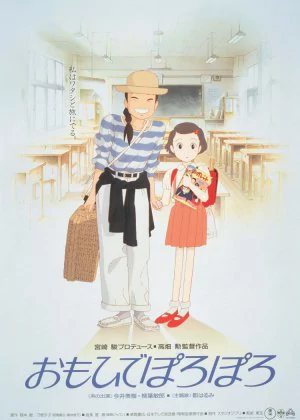Only Yesterday
Even though Hayao Miyazaki is without a doubt the most popular director of the two Ghibli founders, I'd pick Isao Takahata over Miyazaki every time. Only Yesterday [Omohide Poro Poro] further fuels this belief as it is probably the best worst film ever made. It's a film I should be hating with a vengeance, something I should reject with every fiber in my body, but ended up loving nonetheless.
![screen capture of Only Yesterday [Omohide Poro Poro]](/thumbs/img/articles/1200xauto/only-yesterday-1.webp)
At least on paper Only Yesterday looked like a film that had nothing to offer me. Not even so much because Takahata keeps a very female perspective throughout the film (I'm a pretty big Ryuichi Hiroki fan after all), but because the film thrives on melancholy and glorifies the country life. Two of my least favorite sentiments bundled into one single 118-minute film. Then again, the ultimate trait of a good director is to successfully convey sentiments through film that one would normally never experience, and if anything that's where Takahata ultimately succeeds with Only Yesterday.
Takahata's film is quite special because it's one of the first Japanese animation films ever to take on the adult drama genre. Only Yesterday is targeted at adults who appreciate a thoughtful (though still lighthearted) drama, something that was almost unheard of before Takahata released this film. In that way, it helped to pave the way for more adult-oriented animation films (of the non-erotic kind of course) in Japan.
The film is based on a manga (of the same title) written by Hotaru Okamoto and Yuko Tone. Taeko is a 27-year-old single who enjoys her free life in the city, but dreams of visiting the countryside once more. Ever since she was small she dreamed of going on a trip there (a dream fueled by the summer vacation tales of her classmates), so much that the countryside became an obsession to Taeko. As she travels to a small family farm to help out with the farm work, she starts to remember various scenes from her childhood. Takahata took the flashbacks directly from the manga, but came up with the story of the 27-year-old Taeko himself to strengthen the plot.
![screen capture of Only Yesterday [Omohide Poro Poro]](/thumbs/img/articles/1200xauto/only-yesterday-2.webp)
Visually the film is divided into two different parts. The flashback scenes enjoy a less detailed art style, definitely not as hardcore, but you can already recognize the first seeds of Takahata's My Neighbors the Yamadas here. The present day scenes are more detailed, sporting pretty realistic character builds and beautifully drawn settings. The sunsets in particular are of extreme beauty, the play of light is simply spectacular. The animation itself is spot on too, though that's a given when watching Ghibli films.
The soundtrack is an interesting mix of classic Japanese music, typical drama tunes and some weird Romanian folk songs that blend surprisingly well with the rest of the film. While not really my type of music it works splendidly. But Takahata saves the best for last. A superb Japanese adaptation of McBroom's The Rose is used during the final scene and sets the tone for a magnificent emotional climax. Undoubtedly one of the best film endings ever. The voice acting too is of high quality. Takahata plays around with local dialects and stays away from typical overstated anime voice acting to lend the film an even more realistic feel.
![screen capture of Only Yesterday [Omohide Poro Poro]](/thumbs/img/articles/1200xauto/only-yesterday-3.webp)
Watching Only Yesterday feels like going on a (very) short vacation, in that sense it reminded me a lot of Ogigami's Glasses, a film that emits a similar vibe of peace and quiet. There aren't any big dramatic swoops, nor any major events or surprising plot twists. The setup in simple, the setting is simple, but the execution is absolute perfection. It's a feeling that lasts as long as the movie does, the film isn't convincing in the sense that after watching it I'm actually longing to go back to the countryside, but while the film lasts that doesn't matter a bit.
Takahata is one of the absolute masters of animation. He is without a doubt the most mature animation director there, making films that transcend the genre while still making use of its biggest strengths. Only Yesterday is pretty much a perfect film. The themes may not be to my liking and I may not even agree with the things brought forward, but while watching the film that doesn't matter a single bit. And that I think is cinema at its very best.
